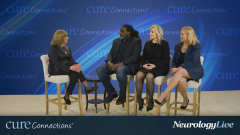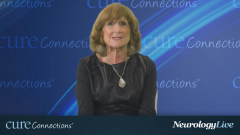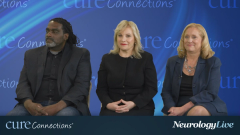
Multiple Sclerosis Journey: Peer to Peer Support
Craig Mainor and Gina Murdoch share peer-to-peer support resources for individuals living with multiple sclerosis.
Episodes in this series

June Halper, MSN, APN-C, MSCN, FAAN: Craig, what’s the biggest challenge you’ve faced as a
man of color—a face out of a place, in a sense? Because women are diagnosed with MS [multiple sclerosis] more frequently. What’s the biggest challenge you’ve faced?
Craig Mainor: The personal challenge was to understand that there was something wrong. I don’t want to say it’s my culture, but in the way I was brought up, you take your licks, and you keep walking. I noticed a loss of dexterity in my left hand, which isn’t my dominant hand. I wanted to ignore it and pray that it goes away. Mentally, I had to come to terms with my own mortality. But you can’t ignore things like that. It’s important to seek professional help, both physically and mentally. I had a bout where I needed both. I needed support both physically and with my mental response to what I was going through. I enjoyed talking to other men of color about taking the temperature of yourself and understanding what you can fix and what you need help to fix things that you can’t. That’s important, and that’s the message I want to make sure others understand.
June Halper, MSN, APN-C, MSCN, FAAN: Have you met any other men with MS?
Craig Mainor: I have. You asked me the question before: do I tell others about my MS? Yes. What I have found is that when I share my challenge, others come out and say, “I know somebody who had it.” Then it evolved to, “I was just diagnosed with it.” In the last 10 years, I’ve met maybe 20 individuals because of my openness to share what I’m going through. Some of them are my age and men of color who are going through the same challenge. I’ve even referred some individuals to Dr Picone because they needed more resources, and I’ve been able to share my journey.
June Halper, MSN, APN-C, MSCN, FAAN: Gina, does the MSAA [Multiple Sclerosis Association of America] offer support groups for newly diagnosed individuals who are going through a rough time?
Gina Murdoch: My MS community is an online version of a community. We have patient ambassadors who drive conversations. But it allows for that peer-to-peer conversation of individuals living with MS. You can be anonymous because it’s online, so you can be wherever you are. But it gives an opportunity to talk about some of the challenges individuals have and allows care partners to be in the conversation as well. It’s been an incredibly supportive community. There are about 7000 individuals across the United States and a couple in the United Kingdom. But the conversation is how am I dealing with my MS? What are some of the challenges that I’m having? Or if they’re newly diagnosed, they can I hear from others. They can talk about if they’re seeing this symptom, or their daughter has this symptom. We don’t have an individual 1, but we have this wonderful platform that has grown because those conversations and connections have grown among those living with and impacted by MS across the country to provide a forum for community, connection, information, care, and compassion. We’ve talked to individuals for whom it’s been a lifeline, especially during COVID-19 when we couldn’t have in-person support-group programs. It gave individuals a sense of connection where they could talk about what they were experiencing in a way that filled their souls and met their need for connection. But was done in a safe way when we couldn’t have in-person connection.
Transcript edited for clarity
Newsletter
Keep your finger on the pulse of neurology—subscribe to NeurologyLive for expert interviews, new data, and breakthrough treatment updates.













